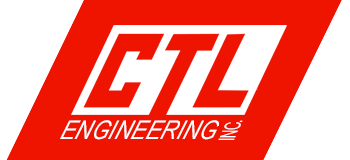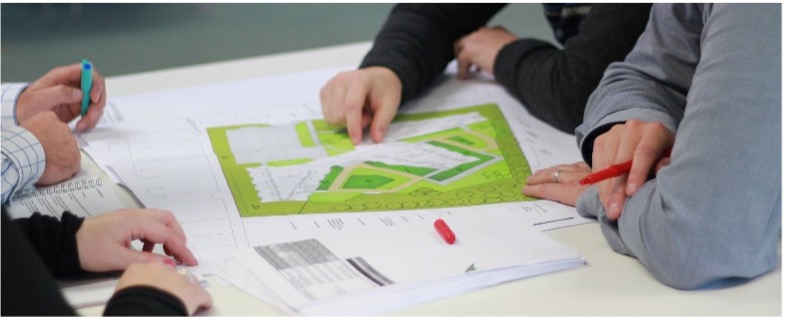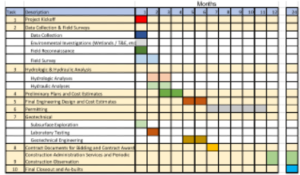Three of the most commonly asked civil engineering questions and one you may have forgotten.
At the start of any civil engineering project, most clients share the same few questions. In this blog post, we will cover the three most commonly asked questions, how to prepare for the best chances of receiving an accurate answer or solution, and one question you may forget to ask.
1. What permits and approvals are needed for my project?
Almost every civil engineering project requires at least one or multiple permits. But what type of permits you need and how many depend on your individual jurisdiction, your intended use of the property, and the property itself.

Many projects require a wetland permit, even if a wetland is not immediately apparent.
Regardless of the project size or type, you will likely need to check for:
- Zoning or Land Use Permits
- Utility-related Permits
But many projects, can also require:
- Stormwater permits
- Grading permits
- Right-of-way permits
- Wetlands permits
- Cutting Trees/ Removal permits
- Federal and State permits, such as those required by the EPA and DNR.
How can you ensure the best answer to this question?
In order to provide you with the best answer, civil engineers evaluate your project holistically and will likely ask questions to better understand your project and your goal. Some permits can be based on the property size, the amount of land disturbance you plan to do on the property, or the location and how protected your individual property is. By knowing as much information ahead of time as possible about your plans for the site, civil engineers can provide the best possible guidance to clear the path for site permitting, design, and construction.
What is the estimated timeframe for completion?
Although this question is often tied to the first question , it can be more complicated than obtaining permits and producing design plans. Before answering the question, CTL’s civil engineers will try to understand all the stakeholders involved in a project. Stakeholders that can sometimes delay a project include:
-

Many factors affect a project timeline
Utilities, such as gas or water lines – particularly when services are new or need to be extended.
- Permitting jurisdictions
- Community involvement, either during construction or after the fact.
- The client themselves, with delays such as getting access to a site or information that is inadvertently not shared upfront.
- Unforeseen environmental factors, such as finding a wetland or environmental contamination, or geohazards, that weren’t initially apparent.
How can you ensure the best answer to this question
Evaluate and disclose all stakeholders and potential hiccups up front. If you anticipate community involvement will be necessary, for instance, allow your civil engineer to help build that into the plan. If you have access to environmental studies or other site-specific information on the site, disclose that information as soon as possible.
What are the potential risks?
This question is tricky because risk is inherently tied to budget, risk tolerance, and the safety and wellbeing of the public and the environment. Civil engineers will work with clients at the beginning of the project to balance budgetary concerns with the necessary due diligence required to mitigate risk to the client’s tolerance level while not jeopardizing the safety and well-being of the public and the environment.
For instance:
- Geotechnical engineering to mitigate the risk of sinkholes, landslides, or earthquakes, etc.
- Hydraulic modeling or soil analysis to mitigate flood risk
- Redundancies built into a stormwater design to ensure your development doesn’t release stormwater onto a neighbor’s properties.
By combining civil engineers’ expertise with a client’s own comfort for risk and budget, civil engineers can help provide the appropriate level of due diligence and design.
How can you ensure the best answer to this question?
Some due diligence will be non-negotiable to get your project completed. Your civil engineering team will work with you to ensure that a minimum level of due diligence occurs. But to provide the best answer to this question, assess your own level of risk tolerance or that of your organization before the first meeting. Do you have any areas of risk that you are particularly concerned about?
One question you may have forgotten: How can you consider a civil engineering consultant as an extension of your team?
Civil engineering projects run smoothest when the client provides all the pertinent and available project information in full disclosure at the beginning. Concern from nearby citizens, known access and easement issues, environmental studies, and geotechnical investigations performed years ago that revealed risks and potential wetlands are just some of the many problems that can derail a project if they aren’t disclosed upfront. Although a client may be tempted to brush over issues in the hopes of getting a project done quickly, forgetting to disclose information is a common cause of delay or impact on a project schedule.
Civil engineers at CTL are trained to ask critical questions, engage with clients early on, identify potential obstacles, and communicate them back to the client and stakeholders as appropriate. Clients can make this easier by being transparent about their project goals and expectations at the beginning of the project and incorporating CTL engineers as an extension of their internal team.
To learn more about civil engineering at CTL Engineering, use the form below to contact one of our specialists.


